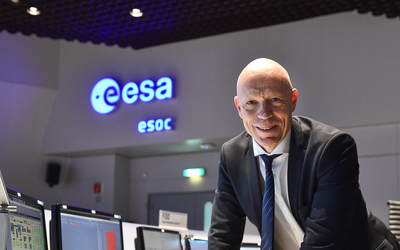Accept all cookies Accept only essential cookies See our Cookie Notice

About ESA
The European Space Agency (ESA) is Europe’s gateway to space. Its mission is to shape the development of Europe’s space capability and ensure that investment in space continues to deliver benefits to the citizens of Europe and the world.
Highlights
ESA - United space in Europe
This is ESA ESA facts Member States & Cooperating States Funding Director General Top management For Member State Delegations European vision European Space Policy ESA & EU Space Councils Responsibility & Sustainability Annual Report Calendar of meetings Corporate newsEstablishments & sites
ESA Headquarters ESA ESTEC ESA ESOC ESA ESRIN ESA EAC ESA ESAC Europe's Spaceport ESA ESEC ESA ECSAT Brussels Office Washington OfficeWorking with ESA
Business with ESA ESA Commercialisation Gateway Law at ESA Careers Cyber resilience at ESA IT at ESA Newsroom Partnerships Merchandising Licence Education Open Space Innovation Platform Integrity and Reporting Administrative Tribunal Health and SafetyMore about ESA
History ESA Historical Archives Exhibitions Publications Art & Culture ESA Merchandise Kids Diversity ESA Brand CentreLatest
Space in Member States
Find out more about space activities in our 23 Member States, and understand how ESA works together with their national agencies, institutions and organisations.
Science & Exploration
Exploring our Solar System and unlocking the secrets of the Universe
Go to topicAstronauts
Missions
Juice Euclid Webb Solar Orbiter BepiColombo Gaia ExoMars Cheops Exoplanet missions More missionsActivities
International Space Station Orion service module Gateway Concordia Caves & Pangaea BenefitsLatest
Space Safety
Protecting life and infrastructure on Earth and in orbit
Go to topicAsteroids
Asteroids and Planetary Defence Asteroid danger explained Flyeye telescope: asteroid detection Hera mission: asteroid deflection Near-Earth Object Coordination CentreSpace junk
About space debris Space debris by the numbers Space Environment Report In space refuelling, refurbishing and removingSafety from space
Clean Space ecodesign Zero Debris Technologies Space for Earth Supporting Sustainable DevelopmentLatest
Applications
Using space to benefit citizens and meet future challenges on Earth
Go to topicObserving the Earth
Observing the Earth Future EO Copernicus Meteorology Space for our climate Satellite missionsCommercialisation
ESA Commercialisation Gateway Open Space Innovation Platform Business Incubation ESA Space SolutionsLatest
Enabling & Support
Making space accessible and developing the technologies for the future
Go to topicBuilding missions
Space Engineering and Technology Test centre Laboratories Concurrent Design Facility Preparing for the future Shaping the Future Discovery and Preparation Advanced Concepts TeamSpace transportation
Space Transportation Ariane Vega Space Rider Future space transportation Boost! Europe's Spaceport Launches from Europe's Spaceport from 2012Latest

Rolf Densing
Thank you for liking
You have already liked this page, you can only like it once!
Rolf Densing is ESA's Director of Operations (D/OPS), and Head of ESOC, in Darmstadt, Germany, taking up duty on 1 January 2016.
Rolf Densing has been working in the space sector for more than 25 years. He graduated with a doctorate in physics from the University of Bonn in 1988. After completing his studies at the Max Planck Institute for Radio Astronomy, he began his scientific career as Assistant Professor of Electrical Engineering and Physics at the University of Virginia in Charlottesville, USA.
From 1992 to 1995, he worked as a project manager in the space science programme of the former German space agency DARA (now DLR, the German Aerospace Center). Among other things, he worked on a series of scientific missions with the German Astro-SPAS platform, which flew on several Space Shuttle missions.
In 1996, Rolf Densing took on a managerial role as US Representative in the DARA/DLR Washington Office, then three years later he moved to DLR headquarters in Cologne as Head of the Executive Office. From 2003 onwards, he headed the ESA Affairs department at the DLR Space Administration until the DLR Senate appointed him Director of Programmes in 2009.
Before joining ESA, Rolf Densing was the Director of Space Programmes at the DLR Space Administration, where he was responsible for Germany’s involvement in the ESA’s research, technology and infrastructure programmes. He contributed to national space strategy at programmatic and policy level, including the evolution of space operations centres in Germany.
-
CREDIT
ESA–Philippe Sebirot -
LICENCE
ESA Standard Licence

Rolf Densing

Rolf Densing during an interaction with media on ‘Space 4.0’

Rolf Densing

Rolf Densing















 Germany
Germany
 Austria
Austria
 Belgium
Belgium
 Denmark
Denmark
 Spain
Spain
 Estonia
Estonia
 Finland
Finland
 France
France
 Greece
Greece
 Hungary
Hungary
 Ireland
Ireland
 Italy
Italy
 Luxembourg
Luxembourg
 Norway
Norway
 The Netherlands
The Netherlands
 Poland
Poland
 Portugal
Portugal
 Czechia
Czechia
 Romania
Romania
 United Kingdom
United Kingdom
 Slovenia
Slovenia
 Sweden
Sweden
 Switzerland
Switzerland























